- Home
- Arthur Conan Doyle
The Hound of the Baskervilles Page 7
The Hound of the Baskervilles Read online
Page 7
Chapter 7
The Stapletons of Merripit House
The fresh beauty of the following morning did something to effacefrom our minds the grim and gray impression which had been leftupon both of us by our first experience of Baskerville Hall. AsSir Henry and I sat at breakfast the sunlight flooded in throughthe high mullioned windows, throwing watery patches of colourfrom the coats of arms which covered them. The dark panellingglowed like bronze in the golden rays, and it was hard to realizethat this was indeed the chamber which had struck such a gloominto our souls upon the evening before.
"I guess it is ourselves and not the house that we have toblame!" said the baronet. "We were tired with our journey andchilled by our drive, so we took a gray view of the place. Now weare fresh and well, so it is all cheerful once more."
"And yet it was not entirely a question of imagination," Ianswered. "Did you, for example, happen to hear someone, a womanI think, sobbing in the night?"
"That is curious, for I did when I was half asleep fancy that Iheard something of the sort. I waited quite a time, but there wasno more of it, so I concluded that it was all a dream."
"I heard it distinctly, and I am sure that it was really the sobof a woman."
"We must ask about this right away." He rang the bell and askedBarrymore whether he could account for our experience. It seemedto me that the pallid features of the butler turned a shade palerstill as he listened to his master's question.
"There are only two women in the house, Sir Henry," he answered."One is the scullery-maid, who sleeps in the other wing. Theother is my wife, and I can answer for it that the sound couldnot have come from her."
And yet he lied as he said it, for it chanced that afterbreakfast I met Mrs. Barrymore in the long corridor with the sunfull upon her face. She was a large, impassive, heavy-featuredwoman with a stern set expression of mouth. But her tell-taleeyes were red and glanced at me from between swollen lids. It wasshe, then, who wept in the night, and if she did so her husbandmust know it. Yet he had taken the obvious risk of discovery indeclaring that it was not so. Why had he done this? And why didshe weep so bitterly? Already round this pale-faced, handsome,black-bearded man there was gathering an atmosphere of mysteryand of gloom. It was he who had been the first to discover thebody of Sir Charles, and we had only his word for all thecircumstances which led up to the old man's death. Was itpossible that it was Barrymore after all whom we had seen in thecab in Regent Street? The beard might well have been the same.The cabman had described a somewhat shorter man, but such animpression might easily have been erroneous. How could I settlethe point forever? Obviously the first thing to do was to see theGrimpen postmaster, and find whether the test telegram had reallybeen placed in Barrymore's own hands. Be the answer what itmight, I should at least have something to report to SherlockHolmes.
Sir Henry had numerous papers to examine after breakfast, so thatthe time was propitious for my excursion. It was a pleasant walkof four miles along the edge of the moor, leading me at last to asmall gray hamlet, in which two larger buildings, which proved tobe the inn and the house of Dr. Mortimer, stood high above therest. The postmaster, who was also the village grocer, had aclear recollection of the telegram.
"Certainly, sir," said he, "I had the telegram delivered to Mr.Barrymore exactly as directed."
"Who delivered it?"
"My boy here. James, you delivered that telegram to Mr. Barrymoreat the Hall last week, did you not?"
"Yes, father, I delivered it."
"Into his own hands?" I asked.
"Well, he was up in the loft at the time, so that I could not putit into his own hands, but I gave it into Mrs. Barrymore's hands,and she promised to deliver it at once."
"Did you see Mr. Barrymore?"
"No, sir; I tell you he was in the loft."
"If you didn't see him, how do you know he was in the loft?"
"Well, surely his own wife ought to know where he is," said thepostmaster testily. "Didn't he get the telegram? If there is anymistake it is for Mr. Barrymore himself to complain."
It seemed hopeless to pursue the inquiry any farther, but it wasclear that in spite of Holmes's ruse we had no proof thatBarrymore had not been in London all the time. Suppose that itwere so--suppose that the same man had been the last who had seenSir Charles alive, and the first to dog the new heir when hereturned to England. What then? Was he the agent of others or hadhe some sinister design of his own? What interest could he havein persecuting the Baskerville family? I thought of the strangewarning clipped out of the leading article of the Times. Was thathis work or was it possibly the doing of someone who was bentupon counteracting his schemes? The only conceivable motive wasthat which had been suggested by Sir Henry, that if the familycould be scared away a comfortable and permanent home would besecured for the Barrymores. But surely such an explanation asthat would be quite inadequate to account for the deep and subtlescheming which seemed to be weaving an invisible net round theyoung baronet. Holmes himself had said that no more complex casehad come to him in all the long series of his sensationalinvestigations. I prayed, as I walked back along the gray, lonelyroad, that my friend might soon be freed from his preoccupationsand able to come down to take this heavy burden of responsibilityfrom my shoulders.
Suddenly my thoughts were interrupted by the sound of runningfeet behind me and by a voice which called me by name. I turned,expecting to see Dr. Mortimer, but to my surprise it was astranger who was pursuing me. He was a small, slim, clean-shaven,prim-faced man, flaxen-haired and lean-jawed, between thirty andforty years of age, dressed in a gray suit and wearing a strawhat. A tin box for botanical specimens hung over his shoulder andhe carried a green butterfly-net in one of his hands.
"You will, I am sure, excuse my presumption, Dr. Watson," saidhe, as he came panting up to where I stood. "Here on the moor weare homely folk and do not wait for formal introductions. You maypossibly have heard my name from our mutual friend, Mortimer. Iam Stapleton, of Merripit House."
"Your net and box would have told me as much," said I, "for Iknew that Mr. Stapleton was a naturalist. But how did you knowme?"
"I have been calling on Mortimer, and he pointed you out to mefrom the window of his surgery as you passed. As our road lay thesame way I thought that I would overtake you and introducemyself. I trust that Sir Henry is none the worse for hisjourney?"
"He is very well, thank you."
"We were all rather afraid that after the sad death of SirCharles the new baronet might refuse to live here. It is askingmuch of a wealthy man to come down and bury himself in a place ofthis kind, but I need not tell you that it means a very greatdeal to the country-side. Sir Henry has, I suppose, nosuperstitious fears in the matter?"
"I do not think that it is likely."
"Of course you know the legend of the fiend dog which haunts thefamily?"
"I have heard it."
"It is extraordinary how credulous the peasants are about here!Any number of them are ready to swear that they have seen such acreature upon the moor." He spoke with a smile, but I seemed toread in his eyes that he took the matter more seriously. "Thestory took a great hold upon the imagination of Sir Charles, andI have no doubt that it led to his tragic end."
"But how?"
"His nerves were so worked up that the appearance of any dogmight have had a fatal effect upon his diseased heart. I fancythat he really did see something of the kind upon that last nightin the Yew Alley. I feared that some disaster might occur, for Iwas very fond of the old man, and I knew that his heart wasweak."
"How did you know that?"
"My friend Mortimer told me."
"You think, then, that some dog pursued Sir Charles, and that hedied of fright in consequence?"
"Have you any better explanation?"
"I have not come to any conclusion."
"Has Mr. Sherlock Holmes?"
The words took away my breath for an instant, but a glance at theplacid face and steadfast eyes of my companion show
ed that nosurprise was intended.
"It is useless for us to pretend that we do not know you, Dr.Watson," said he. "The records of your detective have reached ushere, and you could not celebrate him without being knownyourself. When Mortimer told me your name he could not deny youridentity. If you are here, then it follows that Mr. SherlockHolmes is interesting himself in the matter, and I am naturallycurious to know what view he may take."
"I am afraid that I cannot answer that question."
"May I ask if he is going to honour us with a visit himself?"
"He cannot leave town at present. He has other cases which engagehis attention."
"What a pity! He might throw some light on that which is so darkto us. But as to your own researches, if there is any possibleway in which I can be of service to you I trust that you willcommand me. If I had any indication of the nature of yoursuspicions or how you propose to investigate the case, I mightperhaps even now give you some aid or advice."
"I assure you that I am simply here upon a visit to my friend,Sir Henry, and that I need no help of any kind."
"Excellent!" said Stapleton. "You are perfectly right to be waryand discreet. I am justly reproved for what I feel was anunjustifiable intrusion, and I promise you that I will notmention the matter again."
We had come to a point where a narrow grassy path struck off fromthe road and wound away across the moor. A steep,boulder-sprinkled hill lay upon the right which had in bygonedays been cut into a granite quarry. The face which was turnedtowards us formed a dark cliff, with ferns and brambles growingin its niches. From over a distant rise there floated a grayplume of smoke.
"A moderate walk along this moor-path brings us to MerripitHouse," said he. "Perhaps you will spare an hour that I may havethe pleasure of introducing you to my sister."
My first thought was that I should be by Sir Henry's side. Butthen I remembered the pile of papers and bills with which hisstudy table was littered. It was certain that I could not helpwith those. And Holmes had expressly said that I should study theneighbours upon the moor. I accepted Stapleton's invitation, andwe turned together down the path.
"It is a wonderful place, the moor," said he, looking round overthe undulating downs, long green rollers, with crests of jaggedgranite foaming up into fantastic surges. "You never tire of themoor. You cannot think the wonderful secrets which it contains.It is so vast, and so barren, and so mysterious."
"You know it well, then?"
"I have only been here two years. The residents would call me anewcomer. We came shortly after Sir Charles settled. But mytastes led me to explore every part of the country round, and Ishould think that there are few men who know it better than Ido."
"Is it hard to know?"
"Very hard. You see, for example, this great plain to the northhere with the queer hills breaking out of it. Do you observeanything remarkable about that?"
"It would be a rare place for a gallop."
"You would naturally think so and the thought has cost severaltheir lives before now. You notice those bright green spotsscattered thickly over it?"
"Yes, they seem more fertile than the rest."
Stapleton laughed.
"That is the great Grimpen Mire," said he. "A false step yondermeans death to man or beast. Only yesterday I saw one of the moorponies wander into it. He never came out. I saw his head forquite a long time craning out of the bog-hole, but it sucked himdown at last. Even in dry seasons it is a danger to cross it, butafter these autumn rains it is an awful place. And yet I can findmy way to the very heart of it and return alive. By George, thereis another of those miserable ponies!"
Something brown was rolling and tossing among the green sedges.Then a long, agonized, writhing neck shot upward and a dreadfulcry echoed over the moor. It turned me cold with horror, but mycompanion's nerves seemed to be stronger than mine.
"It's gone!" said he. "The mire has him. Two in two days, andmany more, perhaps, for they get in the way of going there in thedry weather, and never know the difference until the mire hasthem in its clutches. It's a bad place, the great Grimpen Mire."
"And you say you can penetrate it?"
"Yes, there are one or two paths which a very active man cantake. I have found them out."
"But why should you wish to go into so horrible a place?"
"Well, you see the hills beyond? They are really islands cut offon all sides by the impassable mire, which has crawled round themin the course of years. That is where the rare plants and thebutterflies are, if you have the wit to reach them."
"I shall try my luck some day."
He looked at me with a surprised face.
"For God's sake put such an idea out of your mind," said he."Your blood would be upon my head. I assure you that there wouldnot be the least chance of your coming back alive. It is only byremembering certain complex landmarks that I am able to do it."
"Halloa!" I cried. "What is that?"
A long, low moan, indescribably sad, swept over the moor. Itfilled the whole air, and yet it was impossible to say whence itcame. From a dull murmur it swelled into a deep roar, and thensank back into a melancholy, throbbing murmur once again.Stapleton looked at me with a curious expression in his face.
"Queer place, the moor!" said he.
"But what is it?"
"The peasants say it is the Hound of the Baskervilles calling forits prey. I've heard it once or twice before, but never quite soloud."
I looked round, with a chill of fear in my heart, at the hugeswelling plain, mottled with the green patches of rushes. Nothingstirred over the vast expanse save a pair of ravens, whichcroaked loudly from a tor behind us.
"You are an educated man. You don't believe such nonsense asthat?" said I. "What do you think is the cause of so strange asound?"
"Bogs make queer noises sometimes. It's the mud settling, or thewater rising, or something."
"No, no, that was a living voice."
"Well, perhaps it was. Did you ever hear a bittern booming?"
"No, I never did."
"It's a very rare bird--practically extinct--in England now, butall things are possible upon the moor. Yes, I should not besurprised to learn that what we have heard is the cry of the lastof the bitterns."
"It's the weirdest, strangest thing that ever I heard in mylife."
"Yes, it's rather an uncanny place altogether. Look at the hill-side yonder. What do you make of those?"
The whole steep slope was covered with gray circular rings ofstone, a score of them at least.
"What are they? Sheep-pens?"
"No, they are the homes of our worthy ancestors. Prehistoric manlived thickly on the moor, and as no one in particular has livedthere since, we find all his little arrangements exactly as heleft them. These are his wigwams with the roofs off. You can evensee his hearth and his couch if you have the curiosity to goinside.
"But it is quite a town. When was it inhabited?"
"Neolithic man--no date."
"What did he do?"
"He grazed his cattle on these slopes, and he learned to dig fortin when the bronze sword began to supersede the stone axe. Lookat the great trench in the opposite hill. That is his mark. Yes,you will find some very singular points about the moor, Dr.Watson. Oh, excuse me an instant! It is surely Cyclopides."
A small fly or moth had fluttered across our path, and in aninstant Stapleton was rushing with extraordinary energy and speedin pursuit of it. To my dismay the creature flew straight for thegreat mire, and my acquaintance never paused for an instant,bounding from tuft to tuft behind it, his green net waving in theair. His gray clothes and jerky, zigzag, irregular progress madehim not unlike some huge moth himself. I was standing watchinghis pursuit with a mixture of admiration for his extraordinaryactivity and fear lest he should lose his footing in thetreacherous mire, when I heard the sound of steps, and turninground found a woman near me upon the path. She had come from thedirection in which the plume of smoke indicated the position ofMerripit House, but the dip
of the moor had hid her until she wasquite close.
I could not doubt that this was the Miss Stapleton of whom I hadbeen told, since ladies of any sort must be few upon the moor,and I remembered that I had heard someone describe her as being abeauty. The woman who approached me was certainly that, and of amost uncommon type. There could not have been a greater contrastbetween brother and sister, for Stapleton was neutral tinted,with light hair and gray eyes, while she was darker than anybrunette whom I have seen in England--slim, elegant, and tall.She had a proud, finely cut face, so regular that it might haveseemed impassive were it not for the sensitive mouth and thebeautiful dark, eager eyes. With her perfect figure and elegantdress she was, indeed, a strange apparition upon a lonelymoorland path. Her eyes were on her brother as I turned, and thenshe quickened her pace towards me. I had raised my hat and wasabout to make some explanatory remark, when her own words turnedall my thoughts into a new channel.
"Go back!" she said. "Go straight back to London, instantly."
I could only stare at her in stupid surprise. Her eyes blazed atme, and she tapped the ground impatiently with her foot.
"Why should I go back?" I asked.
"I cannot explain." She spoke in a low, eager voice, with acurious lisp in her utterance. "But for God's sake do what I askyou. Go back and never set foot upon the moor again."
"But I have only just come."
"Man, man!" she cried. "Can you not tell when a warning is foryour own good? Go back to London! Start to-night! Get away fromthis place at all costs! Hush, my brother is coming! Not a wordof what I have said. Would you mind getting that orchid for meamong the mares-tails yonder? We are very rich in orchids on themoor, though, of course, you are rather late to see the beautiesof the place."
Stapleton had abandoned the chase and came back to us breathinghard and flushed with his exertions.
"Halloa, Beryl!" said he, and it seemed to me that the tone ofhis greeting was not altogether a cordial one.
"Well, Jack, you are very hot."
"Yes, I was chasing a Cyclopides. He is very rare and seldomfound in the late autumn. What a pity that I should have missedhim!" He spoke unconcernedly, but his small light eyes glancedincessantly from the girl to me.
"You have introduced yourselves, I can see."
"Yes. I was telling Sir Henry that it was rather late for him tosee the true beauties of the moor."
"Why, who do you think this is?"
"I imagine that it must be Sir Henry Baskerville."
"No, no," said I. "Only a humble commoner, but his friend. Myname is Dr. Watson."
A flush of vexation passed over her expressive face. "We havebeen talking at cross purposes," said she.
"Why, you had not very much time for talk," her brother remarkedwith the same questioning eyes.
"I talked as if Dr. Watson were a resident instead of beingmerely a visitor," said she. "It cannot much matter to himwhether it is early or late for the orchids. But you will comeon, will you not, and see Merripit House?"
A short walk brought us to it, a bleak moorland house, once thefarm of some grazier in the old prosperous days, but now put intorepair and turned into a modern dwelling. An orchard surroundedit, but the trees, as is usual upon the moor, were stunted andnipped, and the effect of the whole place was mean andmelancholy. We were admitted by a strange, wizened, rusty-coatedold manservant, who seemed in keeping with the house. Inside,however, there were large rooms furnished with an elegance inwhich I seemed to recognize the taste of the lady. As I lookedfrom their windows at the interminable granite-flecked moorrolling unbroken to the farthest horizon I could not but marvelat what could have brought this highly educated man and thisbeautiful woman to live in such a place.
"Queer spot to choose, is it not?" said he as if in answer to mythought. "And yet we manage to make ourselves fairly happy, do wenot, Beryl?"
"Quite happy," said she, but there was no ring of conviction inher words.
"I had a school," said Stapleton. "It was in the north country.The work to a man of my temperament was mechanical anduninteresting, but the privilege of living with youth, of helpingto mould those young minds, and of impressing them with one's owncharacter and ideals, was very dear to me. However, the fateswere against us. A serious epidemic broke out in the school andthree of the boys died. It never recovered from the blow, andmuch of my capital was irretrievably swallowed up. And yet, if itwere not for the loss of the charming companionship of the boys,I could rejoice over my own misfortune, for, with my strongtastes for botany and zoology, I find an unlimited field of workhere, and my sister is as devoted to Nature as I am. All this,Dr. Watson, has been brought upon your head by your expression asyou surveyed the moor out of our window."
"It certainly did cross my mind that it might be a littledull--less for you, perhaps, than for your sister."
"No, no, I am never dull," said she, quickly.
"We have books, we have our studies, and we have interestingneighbours. Dr. Mortimer is a most learned man in his own line.Poor Sir Charles was also an admirable companion. We knew himwell, and miss him more than I can tell. Do you think that Ishould intrude if I were to call this afternoon and make theacquaintance of Sir Henry?"
"I am sure that he would be delighted."
"Then perhaps you would mention that I propose to do so. We mayin our humble way do something to make things more easy for himuntil he becomes accustomed to his new surroundings. Will youcome upstairs, Dr. Watson, and inspect my collection ofLepidoptera? I think it is the most complete one in thesouth-west of England. By the time that you have looked throughthem lunch will be almost ready."
But I was eager to get back to my charge. The melancholy of themoor, the death of the unfortunate pony, the weird sound whichhad been associated with the grim legend of the Baskervilles, allthese things tinged my thoughts with sadness. Then on the top ofthese more or less vague impressions there had come the definiteand distinct warning of Miss Stapleton, delivered with suchintense earnestness that I could not doubt that some grave anddeep reason lay behind it. I resisted all pressure to stay forlunch, and I set off at once upon my return journey, taking thegrass-grown path by which we had come.
It seems, however, that there must have been some short cut forthose who knew it, for before I had reached the road I wasastounded to see Miss Stapleton sitting upon a rock by the sideof the track. Her face was beautifully flushed with herexertions, and she held her hand to her side.
"I have run all the way in order to cut you off, Dr. Watson,"said she. "I had not even time to put on my hat. I must not stop,or my brother may miss me. I wanted to say to you how sorry I amabout the stupid mistake I made in thinking that you were SirHenry. Please forget the words I said, which have no applicationwhatever to you."
"But I can't forget them, Miss Stapleton," said I. "I am SirHenry's friend, and his welfare is a very close concern of mine.Tell me why it was that you were so eager that Sir Henry shouldreturn to London."
"A woman's whim, Dr. Watson. When you know me better you willunderstand that I cannot always give reasons for what I say ordo."
"No, no. I remember the thrill in your voice. I remember the lookin your eyes. Please, please, be frank with me, Miss Stapleton,for ever since I have been here I have been conscious of shadowsall round me. Life has become like that great Grimpen Mire, withlittle green patches everywhere into which one may sink and withno guide to point the track. Tell me then what it was that youmeant, and I will promise to convey your warning to Sir Henry."
An expression of irresolution passed for an instant over herface, but her eyes had hardened again when she answered me.
"You make too much of it, Dr. Watson," said she. "My brother andI were very much shocked by the death of Sir Charles. We knew himvery intimately, for his favourite walk was over the moor to ourhouse. He was deeply impressed with the curse which hung over thefamily, and when this tragedy came I naturally felt that theremust be some grounds for the fears which he had expressed. I wasdistressed the
refore when another member of the family came downto live here, and I felt that he should be warned of the dangerwhich he will run. That was all which I intended to convey.
"But what is the danger?"
"You know the story of the hound?"
"I do not believe in such nonsense."
"But I do. If you have any influence with Sir Henry, take himaway from a place which has always been fatal to his family. Theworld is wide. Why should he wish to live at the place ofdanger?"
"Because it is the place of danger. That is Sir Henry's nature. Ifear that unless you can give me some more definite informationthan this it would be impossible to get him to move."
"I cannot say anything definite, for I do not know anythingdefinite."
"I would ask you one more question, Miss Stapleton. If you meantno more than this when you first spoke to me, why should you notwish your brother to overhear what you said? There is nothing towhich he, or anyone else, could object."
"My brother is very anxious to have the Hall inhabited, for hethinks it is for the good of the poor folk upon the moor. Hewould be very angry if he knew that I have said anything whichmight induce Sir Henry to go away. But I have done my duty nowand I will say no more. I must get back, or he will miss me andsuspect that I have seen you. Good-bye!" She turned and haddisappeared in a few minutes among the scattered boulders, whileI, with my soul full of vague fears, pursued my way toBaskerville Hall.

 The Lost World
The Lost World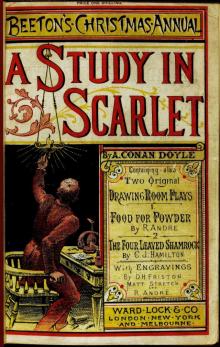 A Study in Scarlet
A Study in Scarlet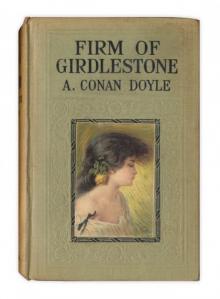 The Firm of Girdlestone
The Firm of Girdlestone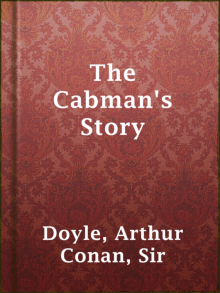 The Cabman's Story
The Cabman's Story The Adventures of Sherlock Holmes
The Adventures of Sherlock Holmes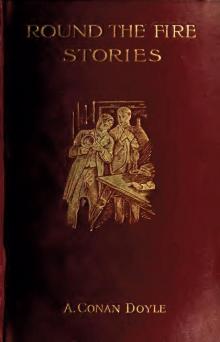 Round the Fire Stories
Round the Fire Stories His Last Bow: An Epilogue of Sherlock Holmes
His Last Bow: An Epilogue of Sherlock Holmes Micah Clarke
Micah Clarke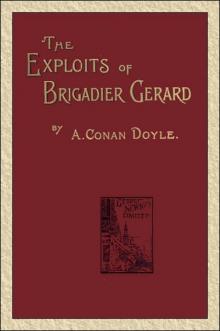 The Exploits of Brigadier Gerard
The Exploits of Brigadier Gerard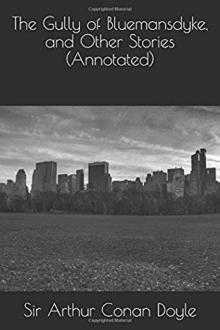 The Gully of Bluemansdyke, and Other stories
The Gully of Bluemansdyke, and Other stories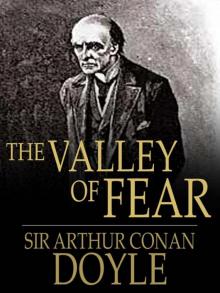 The Valley of Fear
The Valley of Fear The Last of the Legions and Other Tales of Long Ago
The Last of the Legions and Other Tales of Long Ago The Dealings of Captain Sharkey, and Other Tales of Pirates
The Dealings of Captain Sharkey, and Other Tales of Pirates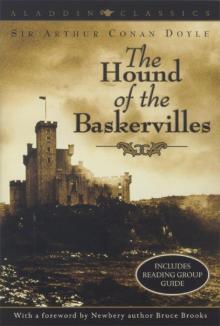 The Hound of the Baskervilles
The Hound of the Baskervilles The Great Shadow and Other Napoleonic Tales
The Great Shadow and Other Napoleonic Tales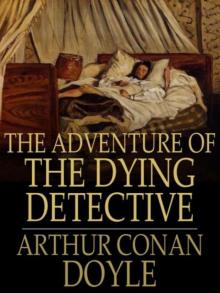 The Adventure of the Dying Detective
The Adventure of the Dying Detective The Man from Archangel, and Other Tales of Adventure
The Man from Archangel, and Other Tales of Adventure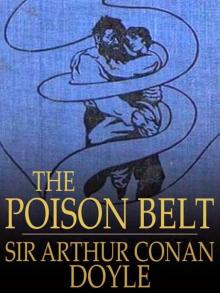 The Poison Belt
The Poison Belt The Last Galley; Impressions and Tales
The Last Galley; Impressions and Tales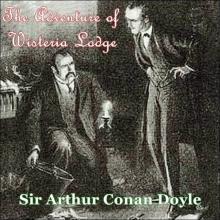 The Adventure of Wisteria Lodge
The Adventure of Wisteria Lodge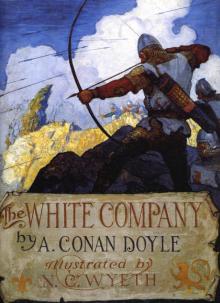 The White Company
The White Company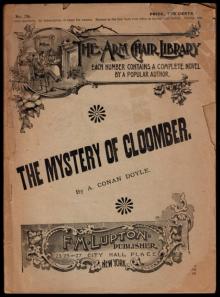 The Mystery of Cloomber
The Mystery of Cloomber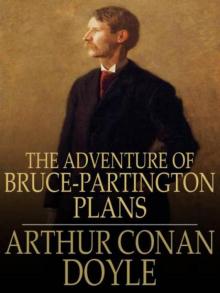 The Adventure of the Bruce-Partington Plans
The Adventure of the Bruce-Partington Plans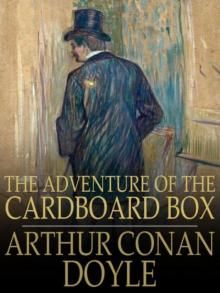 The Adventure of the Cardboard Box
The Adventure of the Cardboard Box Danger! and Other Stories
Danger! and Other Stories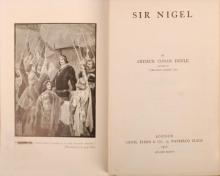 Sir Nigel
Sir Nigel The Return of Sherlock Holmes
The Return of Sherlock Holmes The Adventure of the Devil's Foot
The Adventure of the Devil's Foot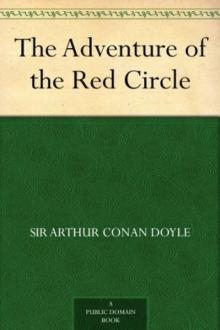 The Adventure of the Red Circle
The Adventure of the Red Circle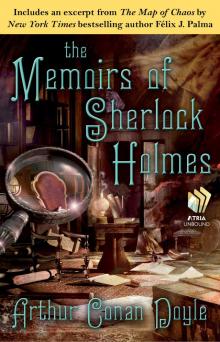 The Memoirs of Sherlock Holmes
The Memoirs of Sherlock Holmes The Adventure of the Yellow Face
The Adventure of the Yellow Face The Adventure of the Norwood Builder
The Adventure of the Norwood Builder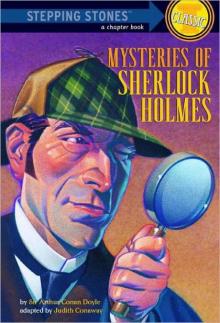 Mysteries of Sherlock Holmes
Mysteries of Sherlock Holmes The Adventure of the Missing Three-Quarter
The Adventure of the Missing Three-Quarter The Adventure of the Final Problem
The Adventure of the Final Problem A Scandal in Bohemia
A Scandal in Bohemia His Last Bow shssc-4
His Last Bow shssc-4 Beyond The City
Beyond The City The Adventure of the Gloria Scott
The Adventure of the Gloria Scott The Parasite
The Parasite The Land Of Mist pcs-3
The Land Of Mist pcs-3 The Adventure of the Musgrave Ritual
The Adventure of the Musgrave Ritual The Complete Sherlock Holmes, Volume I (Barnes & Noble Classics Series)
The Complete Sherlock Holmes, Volume I (Barnes & Noble Classics Series) The Adventure of the Stockbroker's Clerk
The Adventure of the Stockbroker's Clerk The Adventure of the Copper Beeches
The Adventure of the Copper Beeches The New Annotated Sherlock Holmes
The New Annotated Sherlock Holmes When The World Screamed pcs-5
When The World Screamed pcs-5 The Adventure of the Six Napoleons
The Adventure of the Six Napoleons The Case Book of Sherlock Holmes shssc-5
The Case Book of Sherlock Holmes shssc-5 The Sign of Four
The Sign of Four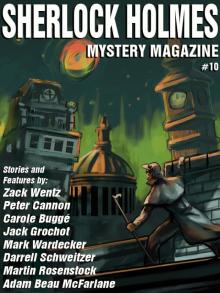 Sherlock Holmes Mystery Magazine #10
Sherlock Holmes Mystery Magazine #10 The Adventures of Brigadier Gerard
The Adventures of Brigadier Gerard The Adventure of the Second Stain
The Adventure of the Second Stain The Adventure of the Engineer's Thumb
The Adventure of the Engineer's Thumb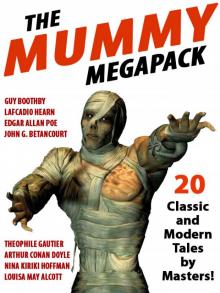 The Mummy Megapack
The Mummy Megapack The Disintegration Machine pcs-4
The Disintegration Machine pcs-4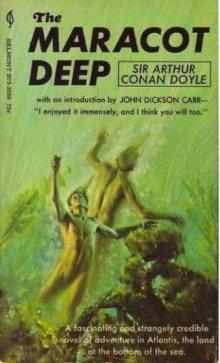 The Maracot Deep
The Maracot Deep The Five Orange Pips
The Five Orange Pips The Adventure of the Crooked Man
The Adventure of the Crooked Man The Adventure of the Blue Carbuncle
The Adventure of the Blue Carbuncle The Adventure of Silver Blaze
The Adventure of Silver Blaze The Adventure of the Solitary Cyclist
The Adventure of the Solitary Cyclist The Adventure of the Naval Treaty
The Adventure of the Naval Treaty Sherlock Holmes. The Complete Stories
Sherlock Holmes. The Complete Stories The Adventures of Sherlock Holmes (sherlock holmes)
The Adventures of Sherlock Holmes (sherlock holmes) The Adventure of the Empty House
The Adventure of the Empty House The Narrative of John Smith
The Narrative of John Smith The Return of Sherlock Holmes (sherlock holmes)
The Return of Sherlock Holmes (sherlock holmes) The New Revelation
The New Revelation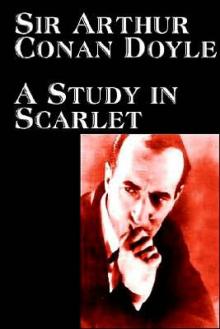 A Study in Scarlet (sherlock holmes)
A Study in Scarlet (sherlock holmes) The Vital Message
The Vital Message Sherlock Holmes Complete Collection
Sherlock Holmes Complete Collection Round the Red Lamp
Round the Red Lamp The Boscombe Valley Mystery
The Boscombe Valley Mystery The Adventure of the Beryl Coronet
The Adventure of the Beryl Coronet The Refugees
The Refugees The Adventure of the Three Students.
The Adventure of the Three Students.